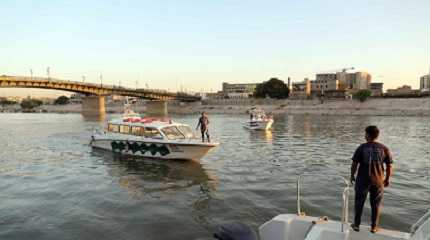
BAGHDAD, July 21 (Xinhua) -- In Iraq's capital Baghdad, a city of more than 9 million people, traffic jams on the streets are way too often and heavy, especially during the commuting at peak hours.
Consequently, many in Baghdad are looking forward to the relaunch of the river taxi, which facilitates the crossing between the banks of the Tigris River that bisects the city, as a way to alleviate the insufferable congestion on the 13 bridges spanning the Iraqi river that watered the civilizations of Mesopotamia throughout history.
During the opening ceremony of the river taxi service this month, Iraqi Minister of Transportation Razzaq Muhaibis said the government is keen to reopen the service after seven years of suspension.
"The current Iraqi government has developed several solutions to overcome traffic jams that lead to delays for employees, students, and all citizens in reaching their workplaces on time, and one of these solutions is the river taxi," Muhaibis explained.
The transportation infrastructure in Baghdad has barely expanded or developed for three decades, mainly because of years of sanctions, wars and sectarian conflict.
Official figures released by Ziad al-Qaisi, the head of the traffic police media office, showed that the number of cars registered in Baghdad exceeds 2.8 million, while the capacity of the capital's streets ranges between 150,000 and 250,000 cars.
"There are traffic jams, so the Ministry of Transportation decided to launch the river taxi in two stations: al-Kadhimiya in northern Baghdad and al-Mutanabi Street in the central city," Muhannad Rayhan, who supervises the river taxi at a station in downtown Baghdad, told Xinhua.
The ministry intends to open more stations to connect several areas from north to south to help further reduce traffic congestion in the city, Rayhan said.
Currently, the river taxi service provides three kinds of boats: 40-passenger, 30-passenger, and 10-passenger, with a single journey costing 2,000 Iraqi dinars (1.53 U.S. dollars), according to Rayhan.
Louay Faleh, a taxi boat sailor, believes that the river taxi boats not only help smooth the traffic but also attract tourists and beautify the river landscape.
"The river taxi travel between al-Mutanabi and al-Kadhimiya takes 15 to 20 minutes, while it takes more than an hour in cars when stuck in traffic congestion," said Faleh.
These boats are a means of entertainment for Iraqi families who would like to enjoy the city view, especially the city lights in the evening, he added.
The boat sailor suggests government purchase new boats, build car parks nearby, and provide subsidized fuel for boats to make river transport more feasible.
In addition, according to Ahmed al-Asadi, the head of the Iraqi State Company for Maritime Transport, the river taxi service has expanded to Najaf, a city some 160 km south of Baghdad.




